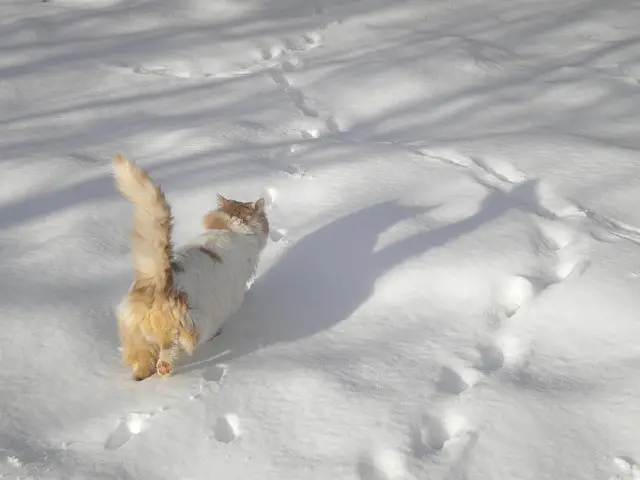It’s that time of year again! The leaves are falling, the temperature is dropping, and you’re bundling up in your coziest sweaters. But what about the stray cats who don’t have a warm home to go to? Here’s what you can expect from your neighborhood strays during winter.
Where do stray cats go in the winter?
In the winter, temperatures can drop significantly, and this can pose a real threat to stray cats who don’t have a warm home to go to.
If a cat is lucky, it may find a kind-hearted soul who will take them in and provide them with shelter, food, and love.
However, many strays are left to fend for themselves. To survive the cold winter, they often seek warm places to sleep, such as under porches or in abandoned buildings.
They also huddle together for warmth and hunt for food more diligently.
Unfortunately, not all strays can make it through the winter. Some succumb to the cold weather, while others starve to death.
Fortunately, some organizations work to help these animals, providing them with food and shelter during the harsh winter months.
What should we do
When the weather outside is frightful, many of us like to curl up with a good book by the fireplace. But for stray cats, winter weather can be downright dangerous. Without a warm place to sleep or regular meals, these cats risk exposure, starvation and even frostbite.
That’s why it’s essential to be aware of your local strays during the winter months and take steps to help them if you can. Here are a few things you can do to help:
1. Provide shelter.
If you have an outdoor cat, consider bringing them inside during the coldest months.
If you can’t do that, build or buy an insulated cat house where they can take refuge from the elements.
You can also put hay or blankets in a sheltered spot to give them extra warmth. Just be sure to change the bedding regularly, so it doesn’t get wet or frozen.
2. Give them extra food.
Stray cats burn more calories in the winter, trying to keep warm so they may be hungrier than usual. Therefore, if you feed outdoor cats, increase their portion sizes and provide them more often during the winter.
And if you know of any strays in your neighborhood who aren’t being fed, please consider doing so yourself—it could save their lives!
3. Protect their paws.
Snow and ice can be painful on kitty paws, so consider using pet-safe ice melt on your sidewalks and driveways. It would be best if you also wiped your cat’s paws off after being outside to remove any salt or chemicals that could irritate their skin.
How do stray cats survive in the winter?
In the winter, temperatures can drop dramatically, leaving strays vulnerable to the cold. To survive, they often huddle together for warmth or seek shelter in abandoned buildings.
However, these measures are not always enough to protect them from the bitter cold. To stay alive, they must also rely on their fur coats.
A cat’s fur comprises two types of hair: guard hairs and downy undercoats. The guard hairs are long and stiff, and they help to keep the woolly undercoats from matting.
In the winter, a cat’s fur coat will grow longer and thicker to provide extra insulation. The coat will also become more oily, which helps to repel water and keep the cat warm even when wet.
With their thick fur coats and natural scavenging instincts, stray cats are well-equipped to survive even the harshest winters.
How do stray cats get food in the winter?
In the winter, food becomes scarce for many animals, including stray cats. While some people may think that these cats can fend for themselves, the truth is that they often struggle to find enough to eat.
One way that they can get food is by scrounging through garbage cans.
However, this is not a reliable food source, and it can be dangerous for cats to rummage through trash.
Another way stray cats get food is by begging for human scraps. Some kind-hearted people will leave out food for these animals, but this is not always enough to meet their needs. As a result, many stray cats suffer from hunger during the winter months.
Conclusion
With just a little effort, we can ensure that all cats—furry friends and strays alike—have a happy and safe winter season!
[su_box title=”Affiliate Disclosure”]This website is supported by its readers. Please assume that all links are affiliate links. If you make a purchase from one of the links we will make a commission from Amazon. Thank you.[/su_box]




